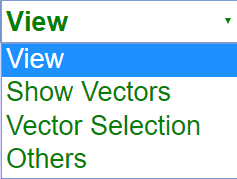About
3D Visualization of vector calculus
This simulation visualizes the basic vector operations in 3D. Activating the button new vectors generates vectors of random orientation, drawn as blue arrows. For better clarity all arrows have an absolute value (length) of 1 and start at the magenta colored origin. They are embedded into a sphere of radius 1, that is shown as a transparent mesh.
At the start two vectors will be visible, a with red filling color of the arrowhead, b with white color.
At the left side one can chose among different perspective projections by radio buttons:
perspective: 3D projection with perspective distortion. It can be rotated with the mouse.
xy-projection: top view of the xy-plane (along the z-axis)
yz-projection: along the x-axis
xz-projection: along the y-axis
no perspective: 3D projection without distortion. It can be rotated with the mouse.
At the bottom the following data are shown for the 2 vectors a and b
Intersecting angle: in degrees.
Product of absolute values: always 1, as both are of length 1.
Scalar product: a∙b = a| |b| cos(a|b), with a|b the intersecting angle.
Absolute value of the vector product: |a x b| = |a| |b| sin(a|b).
At the top the following operations can be activated by check boxes:
Addition: a + b.
Subtraction: a - b.
Subtraction: b - a (= -(a - b)).
Vector product: a x b.
Vector product: b x a (= - a x b).
3 Vectors a + b + c: generation of c and sum (c with yellow filling color).
The chosen combination is maintained when new vectors are generated.
Vector calculus
Vectors
a = (a1 , a2 , a3)
b = (b1 , b2 , b3)
Absolute value (length of the vector arrow) |a| = √(a12 + a22 + a32 )
Addition a + b = (a1+b1 ,a2+b2 , a3+b3) = b + a
Subtraction a - b = (a1 -b1 ,a2- b2 , a3- b3)= - (b - a)
Subtraction b - a = (b1- a1 , b2- a2 , b3- a3) = - (a - b)
Multiplication by a constant k: ka = (ka1 , ka2 , ka3)
Skalar product (internal product) a · b = a1b1 +a2b2 + a3b3 = |a| |b| cos(a|b)
a perpendicular to b ⇒ a|b = 90o ⇒cos( a|b) = 0 ⇒ Scalar Product = 0
Vector product (external product) a x b = (a2b3-b2a3 , a3b1 - b3a1 , a1b2 - a2b1)
Vector product b x a= (b2a3- a2b3 , b3a1 - a3b1 , b1a2 - a1b2) = - a x b
Absolute value of vector product |a x b| = |a| |b| sin(a|b)
a parallel b ⇒ a|b = 0o ⇒sin(a|b) = 0 ⇒ |vp| = 0
a x b and b x a are perpendicular to the plane common to a and b
a , b and a x b form a clockwise tripod
a, b, and b x a form a counter clockwise tripod
when going from a to b and then to the vector product.
E1: Generate random vectors. Rotate the sphere to have a top down look at their common plane. Estimate the angle between the vectors and compare your estimate to the value displayed in the bottom line. Experiment with the different views and reflect well what you see with every one of them.
E2: The product of absolute values is displayed to be 1 (each of the 2 vectors has an absolute value of 1). Compare that to the scalar product. When is the scalar product about the same as the absolute one? When is it zero? Observe the display of the intersecting angle.
E3: Select a + b in the upper row. A thin red vector is affixed to a, whose length and direction are those of b. A thick red vector starting at the origin is the sum vector. Describe its geometric construction. (mentally complete the 3 vector to a parallelogram ). Convince yourself by rotation of the frame, that a, b and a+b are in one plane.
E4: Rotate the frame and observe that the parallelogram construction is valid for every projection.
E5: As E3, but add a + b + c . You will see a third vector c und a sum vector a+b+c, besides the vector a+b. Observe that a, b und c in general will not lie in a plane, but form a tripod with non perpendicular axes. Perform in mind the geometric construction from a+b to a+b+c .
E5: Close other options and choose a - b. A thin complement vector will appear in magenta. Convince yourself by rotating that this construction also works for all projections. Remember that a - (-b) = a + b.
E6: Chose b - a and interpret what b - a = - (a - b) means geometrically.
E7: Close other options and choose the vector product a x b which will appear as a black arrow. Rotate the frame to look along the vector product. Observe that you will look perpendicular at the common plane of a and b (both vectors should touch the sphere periphery).
E8: Choose new vectors several times and note when the absolute value of the vector product is very small or very large. What is the criterion? What are the possible minimum and maximum values? (a and b both have the absolut value of 1).
E9: Chose b x a and interpret what b x a = - a x b means geometrically.
E10: When rotating the frame the length of the vectors and their relativ orientation stay unchanged. They are invariant under rotation. They are also invariant under shift. Confirm this mentally (remember the compensating vectors of the construction)
This file was created in January 2009 by Dieter Roess
This simulation is part of
“Learning and Teaching Mathematics using Simulations
– Plus 2000 Examples from Physics”
ISBN 978-3-11-025005-3, Walter de Gruyter GmbH & Co. KG
Translations
| Code | Language | Translator | Run | |
|---|---|---|---|---|
 |
||||
Credits
 Dieter Roess - WEH- Foundation; Fremont Teng; Loo Kang Wee
Dieter Roess - WEH- Foundation; Fremont Teng; Loo Kang Wee
1. Introduction:
This briefing document summarizes the key themes, important ideas, and functionalities of the "Vectors Operations in 3D JavaScript Simulation Applet HTML5" resource. This interactive simulation, developed by Dieter Roess and others, provides a 3D visualization tool for learning and teaching basic vector operations and vector calculus concepts. It is part of the "Learning and Teaching Mathematics using Simulations – Plus 2000 Examples from Physics" project.
2. Main Themes and Important Ideas:
The primary focus of this resource is to provide an interactive and visual way to understand fundamental vector operations in three dimensions. The simulation emphasizes the geometric interpretation of these operations. Key themes and ideas include:
- 3D Visualization of Vector Calculus: The core of the applet is its ability to display vectors and vector operations in a 3D environment, allowing users to manipulate the viewpoint and observe these concepts from different perspectives. The "About" section states: "This simulation visualizes the basic vector operations in 3D ."
- Basic Vector Operations: The simulation covers essential vector operations such as addition, subtraction, scalar multiplication (implicitly through vector scaling), scalar product (dot product), and vector product (cross product).
- Geometric Interpretation: The resource strongly emphasizes the geometric meaning behind these operations. For example, vector addition is visualized using the parallelogram law, and the vector product is shown as a vector perpendicular to the plane of the original vectors. Experiment E3 explicitly asks users to "mentally complete the 3 vector to a parallelogram."
- Properties of Vector Operations: The simulation allows users to explore key properties, such as the commutative property of vector addition (a + b = b + a) and the anti-commutative property of the vector product (a x b = - b x a).
- Scalar and Vector Products: The simulation provides a direct link between the mathematical formulas for scalar and vector products and their geometric interpretations involving the angle between vectors. The bottom of the applet displays: "Scalar product: a∙b = a| |b| cos( a|b ), with a|b the intersecting angle." and "Absolute value of the vector product: | a x b | = |a| |b| sin( a|b )."
- Orthogonality and Parallelism: The simulation visually demonstrates the conditions for two vectors to be perpendicular (scalar product is zero) or parallel (absolute value of vector product is zero). The "Vector calculus" section states: "a perpendicular to b ⇒ a|b = 90o⇒cos( a|b ) = 0 ⇒ Scalar Product = 0" and "a parallel b ⇒ a|b = 0o ⇒sin( a|b ) = 0 ⇒ | vp | = 0".
- Right-Hand and Left-Hand Rules: The simulation implicitly demonstrates the right-hand rule for the direction of the vector product through the orientation of the tripod formed by a, b, and a x b. It also shows the counter-clockwise tripod for a, b, and b x a.
- Invariance under Rotation and Shift: Experiment E10 highlights that "When rotating the frame the length of the vectors and their relativ orientation stay unchanged. They are invariant under rotation. They are also invariant under shift."
3. Key Features and Functionalities:
The JavaScript simulation offers several interactive features:
- Generating New Vectors: The "new vectors" button creates two (or three with the corresponding checkbox activated) vectors with random orientations, visualized as blue arrows originating from the magenta origin and ending on a unit sphere.
- Perspective Projections: Users can select different viewing perspectives using radio buttons: "perspective", "xy-projection", "yz-projection", "xz-projection", and "no perspective". The perspective views can be rotated with the mouse. Experiment E1 explicitly encourages users to "Experiment with the different views and reflect well what you see with every one of them ."
- Display of Vector Properties: The applet displays the "Intersecting angle" in degrees and the "Product of absolute values" (which is always 1 as the vectors have unit length) for the initial two vectors. It also shows the "Scalar product" and the "Absolute value of the vector product".
- Activating Vector Operations: Check boxes at the top allow users to visualize the results of:
- Addition: a + b (thick red vector representing the sum, with a thin red vector representing b affixed to the end of a).
- Subtraction: a - b (thin magenta "complement vector").
- Subtraction: b - a (thin magenta "complement vector" in the opposite direction of a - b).
- Vector product: a x b (black arrow).
- Vector product: b x a (black arrow in the opposite direction of a x b).
- 3 Vectors a + b + c: Generates a third vector c (yellow arrowhead) and displays the sum a + b + c.
- Interactive Experiments: The "Experiments" section provides a series of guided activities (E1 to E10) that encourage users to explore the properties of vectors and their operations through interaction with the simulation. These experiments prompt observation, estimation, and reflection on the visual and numerical outputs.
- Embeddable Model: The simulation can be easily embedded into other webpages using the provided iframe code.
- Instructions for Use: A dedicated "Instructions" section explains the functions of the "New Vectors" button, the "Combo Box and their Functions" for controlling views and vector visibility, "Toggling Full Screen", and the "Reset Button".
4. Intended Audience and Learning Goals:
This resource is primarily intended for students learning about vectors and vector calculus, likely at the secondary or early undergraduate level. The "Sample Learning Goals" section suggests its use for understanding basic vector operations and their geometric interpretations. Teachers can use this simulation as an interactive tool to illustrate these concepts in the classroom or assign it for independent student exploration.
5. Technical Details:
The simulation is developed using JavaScript and HTML5, making it accessible through modern web browsers without the need for additional plugins. It utilizes the EasyJavaScriptSimulations (EJS) library.
6. Related Resources:
The webpage provides a comprehensive list of other interactive resources available on the platform, covering various topics in physics and mathematics. Some related resources that also involve vectors or magnetism are listed, such as "Magnetic Dipole Field Vector and Field Lines Simulator JavaScript Simulation Applet HTML5" and "Mini Magnetic Golf Game JavaScript Simulation Applet HTML5".
7. Conclusion:
The "Vectors Operations in 3D JavaScript Simulation Applet HTML5" is a valuable open educational resource for visualizing and understanding fundamental vector concepts and operations. Its interactive nature, combined with its clear geometric representations and guided experiments, makes it an effective tool for both student learning and teacher instruction in mathematics and physics. The ability to manipulate the 3D view and observe the results of different vector operations in real-time provides a strong intuitive understanding of these abstract concepts.
Study Guide: 3D Vector Operations Simulation
Quiz
- What is the purpose of the "new vectors" button in the simulation? Describe the initial properties (length and starting point) of the generated vectors.
- Explain the difference between the "perspective" and "no perspective" projection options in the simulation. How does the mouse interaction differ between these two views?
- Describe the geometric interpretation of the vector addition a + b as visualized in Experiment E3. What shape is formed by the origin and the three vectors a, b, and a + b?
- According to the text, what does it mean for two vectors a and b to be perpendicular in terms of their scalar product? What is the value of the cosine of the intersecting angle in this case?
- Explain the relationship between the vector product a x b and b x a. How are their magnitudes and directions related to each other, and to the plane formed by a and b?
- In the simulation, the absolute values (lengths) of vectors a and b are always 1. When will the absolute value of their vector product, |a x b|, be at its maximum and minimum values? What are these values?
- Describe what is meant by the statement that vectors are "invariant under rotation" as mentioned in Experiment E10. How does the simulation visually support this concept?
- What is the formula for calculating the absolute value (length) of a vector a in three dimensions, given its components (a1, a2, a3)?
- Explain the geometric significance of the scalar product a · b in terms of the magnitudes of the vectors and the angle between them.
- What does it mean for the vectors a, b, and a x b to form a "clockwise tripod"? How does this relate to the order of the vectors in the cross product?
Quiz Answer Key
- The "new vectors" button generates two new vectors, labeled a and b, with random orientations in 3D space. Initially, all generated vectors have an absolute value (length) of 1 and start at the magenta colored origin (0, 0, 0).
- The "perspective" projection provides a 3D view with perspective distortion, making objects appear smaller as they are further away. It can be rotated with the mouse. The "no perspective" projection is a 3D view without this distortion and can also be rotated with the mouse.
- Geometrically, vector addition a + b is visualized using the parallelogram law. The sum vector, starting at the origin, forms the diagonal of a parallelogram where vectors a and b are adjacent sides. The three vectors a, b, and a + b lie in one plane.
- When two vectors a and b are perpendicular, their scalar product (a · b) is zero. This is because the intersecting angle between them is 90 degrees, and the cosine of 90 degrees (cos(90°)) is 0.
- The vector products a x b and b x a have the same magnitude but opposite directions. Both resulting vectors are perpendicular to the plane containing vectors a and b. Specifically, b x a = - (a x b).
- The absolute value of the vector product, |a x b| = |a| |b| sin( a|b ), will be at its maximum value of 1 when the angle between a and b is 90 degrees (sin(90°) = 1). It will be at its minimum value of 0 when a and b are parallel or anti-parallel (angle is 0° or 180°, and sin(0°) = sin(180°) = 0).
- "Invariant under rotation" means that when the viewing frame is rotated, the lengths of the vectors and their relative orientation to each other remain unchanged. The simulation demonstrates this as the vectors maintain their lengths and angles between them regardless of how the transparent sphere is rotated.
- The absolute value (length) of a vector a = (a1, a2, a3) is calculated using the formula: |a| = √(a1² + a2² + a3²).
- The scalar product a · b is equal to the product of the magnitudes of the two vectors and the cosine of the angle between them: a · b = |a| |b| cos( a|b ). It can be interpreted as the projection of one vector onto the other, scaled by the magnitude of the other vector.
- A clockwise tripod formed by a, b, and a x b refers to the right-hand rule. If you curl the fingers of your right hand from vector a to vector b, your thumb will point in the direction of the vector product a x b. This indicates the orientation of the resulting vector relative to the original two in a three-dimensional space.
Essay Format Questions
- Discuss the different projection views offered by the simulation (perspective, xy, yz, xz, no perspective) and explain how each view can be useful in understanding the spatial relationships between vectors and the results of vector operations.
- Explain the geometric interpretations of vector addition and subtraction as demonstrated in the simulation. How does the concept of a "complement vector" relate to vector subtraction, and how is this visualized?
- Compare and contrast the scalar product and the vector product of two vectors, focusing on their definitions, the information they provide about the relationship between the vectors, and their geometric interpretations as visualized in the simulation.
- Describe the experiments (E1-E10) provided in the text and analyze how each experiment contributes to a deeper understanding of vector operations and their properties in three dimensions.
- Analyze the significance of the fact that the initial vectors in the simulation have an absolute value of 1. How does this simplification affect the visualization and the interpretation of the scalar and vector products? Discuss the implications if the vectors had arbitrary lengths.
Glossary of Key Terms
- Vector: A quantity having both magnitude (length) and direction, typically represented by an arrow in space. In the context of this simulation, vectors are in 3D space.
- Origin: The starting point (0, 0, 0) of the coordinate system and the initial point for all generated vectors in the simulation.
- Absolute Value (Magnitude): The length of a vector, calculated as the square root of the sum of the squares of its components. Denoted as |a|.
- Scalar Product (Dot Product): An operation that takes two vectors and returns a scalar quantity equal to the product of their magnitudes and the cosine of the angle between them (a · b = |a| |b| cos( a|b )).
- Vector Product (Cross Product): An operation that takes two vectors in 3D space and returns a new vector that is perpendicular to both of the original vectors. Its magnitude is |a x b| = |a| |b| sin( a|b ), and its direction is given by the right-hand rule.
- Intersecting Angle: The angle between two vectors, measured from their tails.
- Projection (Perspective/Orthographic): A way of representing a three-dimensional object or space in two dimensions. Perspective projection includes the effect of distance on apparent size, while orthographic projections (xy, yz, xz, no perspective) do not.
- Invariant under Rotation: A property indicating that a quantity or relationship remains unchanged even when the coordinate system or viewing frame is rotated.
- Clockwise/Counter-Clockwise Tripod: Refers to the orientation of three mutually related vectors (like a, b, and their cross product) according to the right-hand rule. A clockwise tripod for a, b, a x b means that following these vectors in this order resembles a clockwise turn if viewed from the tip of a x b.
- Parallelogram Law of Vector Addition: A geometric method for adding two vectors where the sum vector is the diagonal of the parallelogram formed by the two vectors placed tail-to-tail.
- Complement Vector: In the context of vector subtraction (a - b), this refers to the vector that, when added to b, results in a. In the simulation, it's visualized as a thin magenta arrow.
Sample Learning Goals
[text]
For Teachers
Vectors Operations in 3D JavaScript Simulation Applet HTML5
Instructions
New Vectors
Combo Box and their Functions
Toggling Full Screen
Reset Button
Research
[text]
Video
[text]
Version:
Other Resources
[text]
Frequently Asked Questions: 3D Vector Operations Simulation
What is the purpose of the 3D Vector Operations JavaScript Simulation Applet?
This simulation is designed to visually demonstrate and allow exploration of fundamental vector operations in a three-dimensional space. It helps users understand concepts such as vector addition, subtraction, scalar product (dot product), and vector product (cross product) through interactive manipulation and observation. The 3D visualization aims to provide a more intuitive grasp of these mathematical concepts, particularly their geometric interpretations.
How can I interact with the simulation to explore vector operations?
The simulation provides several interactive elements. You can generate new pairs of vectors with random orientations by clicking the "new vectors" button. The two initial vectors, a (red arrowhead) and b (white arrowhead), are displayed as arrows originating from a central magenta point within a unit sphere. You can select different perspective projections (perspective, xy, yz, xz, no perspective) using the radio buttons to view the vectors from various angles. Furthermore, checkboxes at the top allow you to activate and visualize the results of vector addition (a + b, a - b, b - a, a + b + c), and vector products (a x b, b x a). You can rotate the 3D view using your mouse (for perspective and no perspective modes) to observe the spatial relationships between the vectors and their resultant operations.
What information is displayed about the vectors and their operations?
At the bottom of the simulation, you can see numerical values for the "Intersecting angle" between vectors a and b in degrees, and the "Product of absolute values" (which is always 1 since the initial vectors have a length of 1). Additionally, the simulation displays the "Scalar product" (a∙b) and the "Absolute value of the vector product" (|a x b|). When operations like addition, subtraction, or vector product are activated, the resulting vector is also displayed visually.
How is vector addition and subtraction visualized in the simulation?
When the "Addition: a + b" checkbox is selected, a thin red vector representing b is shown attached to the arrowhead of vector a. The "thick red vector" originating from the origin then represents the sum a + b, illustrating the parallelogram law of vector addition. Similarly, for subtraction (a - b or b - a), a thin "complement" vector (magenta for a - b) is displayed, effectively showing the vector that, when added to the subtracted vector, results in the original vector. The simulation emphasizes that a - b = - (b - a) geometrically.
What does the scalar product (dot product) represent, and how can I explore it in the simulation?
The scalar product (a · b) is a scalar quantity that is related to the cosine of the angle between the two vectors: a · b = |a| |b| cos(θ), where θ is the intersecting angle. Since the initial vectors in the simulation have an absolute value of 1, the scalar product directly corresponds to the cosine of the angle between them. By observing the displayed "Scalar product" value and the "Intersecting angle" as you generate new vectors (Experiment E2), you can see that the scalar product is close to 1 when the angle is small (vectors are nearly parallel), 0 when the angle is 90 degrees (vectors are perpendicular), and -1 when the angle is 180 degrees (vectors are anti-parallel).
What does the vector product (cross product) represent, and how is it visualized?
The vector product (a x b) results in a new vector that is perpendicular to the plane formed by vectors a and b. Its magnitude is given by |a x b| = |a| |b| sin(θ), where θ is the angle between a and b. In the simulation, the vector product a x b is shown as a "black arrow". By rotating the view to look along this black arrow (Experiment E7), you can observe that your line of sight is perpendicular to the plane containing a and b. The simulation also demonstrates that b x a = - (a x b), meaning b x a has the same magnitude but the opposite direction to a x b. The direction of the vector product follows the right-hand rule (or left-hand rule depending on the convention).
Under what conditions is the absolute value of the vector product maximum or minimum in this simulation?
The absolute value of the vector product, |a x b| = |a| |b| sin(θ), depends on the sine of the angle (θ) between the two vectors since the magnitudes |a| and |b| are fixed at 1 in the initial setup. The absolute value of sin(θ) ranges from 0 to 1. Therefore, the absolute value of the vector product is minimum (close to 0) when the angle between a and b is close to 0° or 180° (vectors are nearly parallel or anti-parallel), because sin(0°) = sin(180°) = 0. It is maximum (close to 1) when the angle is close to 90° (vectors are perpendicular), because sin(90°) = 1. You can explore this by repeatedly clicking "new vectors" and observing the displayed "Absolute value of the vector product" and the visual orientation of the vectors (Experiment E8).
What does it mean that the vectors and their relative orientation are invariant under rotation and shift in this simulation?
The statement that vectors and their relative orientation are invariant under rotation (Experiment E10) means that if you rotate your viewpoint or the entire 3D scene, the lengths of the vectors and the angles between them do not change. Similarly, invariance under shift implies that if you were to move the entire configuration of vectors to a different location in space without changing their directions or lengths, their mathematical relationships (sums, differences, dot products, cross products) would remain the same. This highlights a fundamental property of vectors: they are defined by their magnitude and direction, not their position in space. The simulation's design, where vectors originate from a common origin, allows for easier visualization of operations, but the underlying vector concepts are independent of their starting point.
- Details
- Written by Fremont
- Parent Category: Pure Mathematics
- Category: 3 Vectors
- Hits: 7674


.png
)






